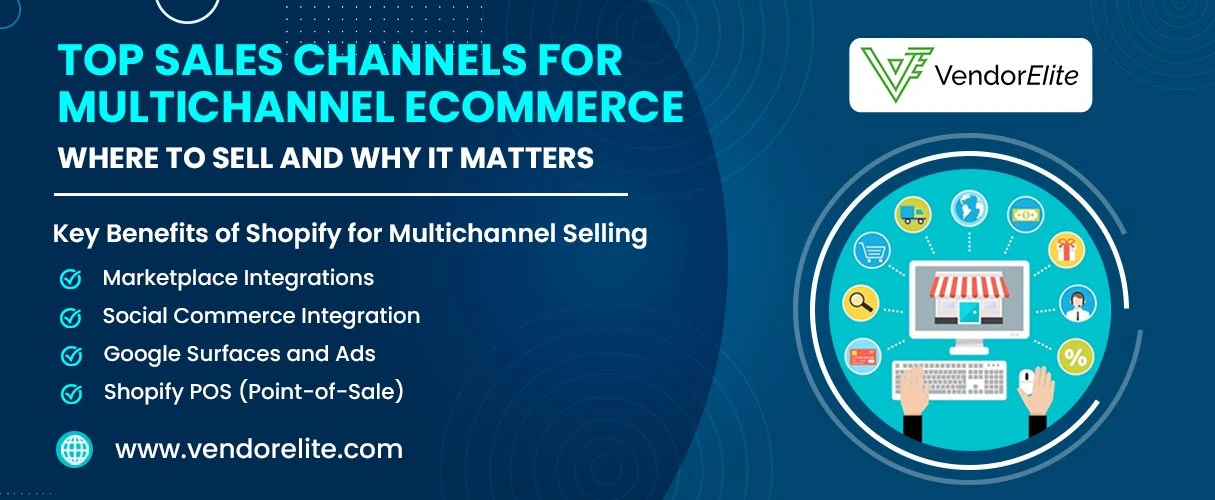
Visit Us: https://www.vendorelite.com
Choosing the right sales channels is a critical step in building a powerful multichannel eCommerce strategy. Whether you’re just starting out or expanding your footprint, understanding how direct and indirect channels work can make all the difference.
Understanding Direct vs. Indirect Sales Channels
Sales channels fall into two primary categories:
- Direct Channels: These include your own ecommerce website, mobile app, or physical store. These give you full control over the customer experience, branding, and profit margins.
- Indirect Channels: These are platforms such as Amazon, eBay, Walmart, and social media marketplaces like Facebook Shop or Instagram Shopping. While they offer access to large audiences and built-in traffic, they also come with listing fees, commission cuts, and limited brand control.
Each has its place. A smart multichannel strategy leverages both to maximize reach and profitability.
Key Direct-to-Consumer (D2C) Channels
Shopify: A Robust Hub for Multichannel Success
Shopify is a leading ecommerce platform that not only helps you build your own branded online store but also integrates seamlessly with multiple sales channels—making it a favorite among multichannel sellers.
Core Benefits of Shopify for Multichannel eCommerce
- Marketplace Integrations:
With apps like Shopify Marketplace Connect, sellers can link their Shopify store to Amazon, Walmart, eBay, and Etsy. These integrations enable real-time inventory syncing, centralized order fulfillment, and performance tracking. - Social Commerce Integration:
Shopify connects directly with top social platforms such as Facebook, Instagram, TikTok, Pinterest, YouTube, and even Snapchat—allowing you to tap into discovery-based commerce where your audience is most active. - Google Surfaces and Ads:
Shopify merchants can promote their products on Google Shopping, Google Images, Google Lens, Maps, and other Google services using the Google & YouTube app. You can create Performance Max campaigns, sync product catalogs, and track analytics through Google Analytics and Google Merchant Center. - Shop App:
A mobile app for customers to track orders, discover brands, and purchase with Shop Pay, offering a convenient and personalized shopping experience. - Shopify POS (Point-of-Sale):
Sell offline and sync in-store and online inventory in real time using Shopify’s POS system. Ideal for retailers who operate both brick-and-mortar stores and online shops.
Functional Highlights
- Unified Inventory Management:
Inventory updates across all platforms in real time—no more overselling or stockouts. - Centralized Analytics:
Understand performance across all channels with a single, unified reporting dashboard. - Streamlined Customer Support:
Access complete customer history and communication from all platforms in one place, enhancing your support capabilities.
Shopify simplifies multichannel management for brands looking to scale. But to truly harness its power across all your sales platforms, you need a solution that ties everything together.
How VendorElite Amplifies Your Multichannel Presence?
While platforms like Shopify give you the tools to sell across various channels, VendorElite.com acts as the central command center – helping sellers manage their entire ecosystem effortlessly.
With VendorElite, you can:
- Sync your product listings across all major marketplaces and social commerce platforms
- Track and manage inventory in real time
- Automate pricing, order routing, and updates across channels
- Monitor performance analytics from one dashboard
- Avoid overselling, delays, and fragmented customer service
VendorElite is designed to complement platforms like Shopify, giving you deeper control and smarter automation for a truly seamless multichannel operation.
Conclusion: Build Smarter, Sell Everywhere
Whether you’re selling on your own website, a global marketplace, or social media, the key to multichannel success lies in integration and automation. By understanding how to leverage both direct and indirect channels—and centralizing your operations with tools like VendorElite—you’re setting your brand up for scalable, sustainable growth.
Take charge of your multichannel eCommerce strategy today with VendorElite.com—where smarter selling begins.
Frequently Asked Questions (FAQ):
- What is a multichannel eCommerce strategy?
A multichannel eCommerce strategy involves selling your products across multiple platforms—like your own website, marketplaces, and social media—to maximize visibility and sales opportunities. - What is the difference between direct and indirect sales channels?
Direct channels include your own website or app, where you control the customer experience. Indirect channels are third-party platforms like Amazon, eBay, or Walmart, where you access larger audiences but with less control. - Why should I use multiple sales channels instead of one?
Using multiple channels helps you reach different customer segments, increase brand exposure, and reduce dependency on a single platform for sales and revenue. - How does Shopify support multichannel selling?
Shopify integrates with marketplaces like Amazon and eBay, and social media platforms like Facebook, Instagram, and TikTok, allowing seamless product syncing and centralized management. - What are the main benefits of using VendorElite with Shopify?
VendorElite helps automate pricing, order management, and inventory updates across multiple platforms, reducing manual work and improving efficiency. - How can VendorElite help prevent overselling?
VendorElite syncs inventory across all your connected sales channels in real time, ensuring that stock levels are always accurate and preventing overselling or stockouts. - Which marketplaces should I prioritize for selling online?
Start with major platforms like Amazon, eBay, and Walmart for reach, then expand to social commerce platforms like Instagram and Facebook based on your target audience. - How do social commerce channels boost eCommerce sales?
Social commerce platforms allow customers to discover and buy products directly through social media, increasing engagement and conversion rates. - Can small businesses benefit from multichannel eCommerce tools like VendorElite?
Yes, VendorElite is built for businesses of all sizes. Small businesses can automate routine tasks, save time, and compete effectively on multiple platforms. - How can I start building a multichannel eCommerce strategy?
Begin by setting up your main online store (e.g., Shopify), identify key marketplaces and social channels, then integrate VendorElite to manage and automate your sales operations seamlessly.
Tags: Multichannel Ecommerce, Ecommerce Sales Channels, Direct Vs Indirect Sales, Shopify Multichannel, Vendorelite, Ecommerce Automation, Amazon Marketplace, Ebay Selling, Walmart Marketplace, Facebook Shop, Instagram Shopping, Social Commerce, Ecommerce Strategy, Shopify Integrations, Inventory Management, Unified Dashboard, Online Retail Growth, Ecommerce Tools, Marketplace Management, Product Syncing, Ecommerce Optimization, Digital Storefronts, Omnichannel Selling, Ecommerce Software, Vendorelite Platform
